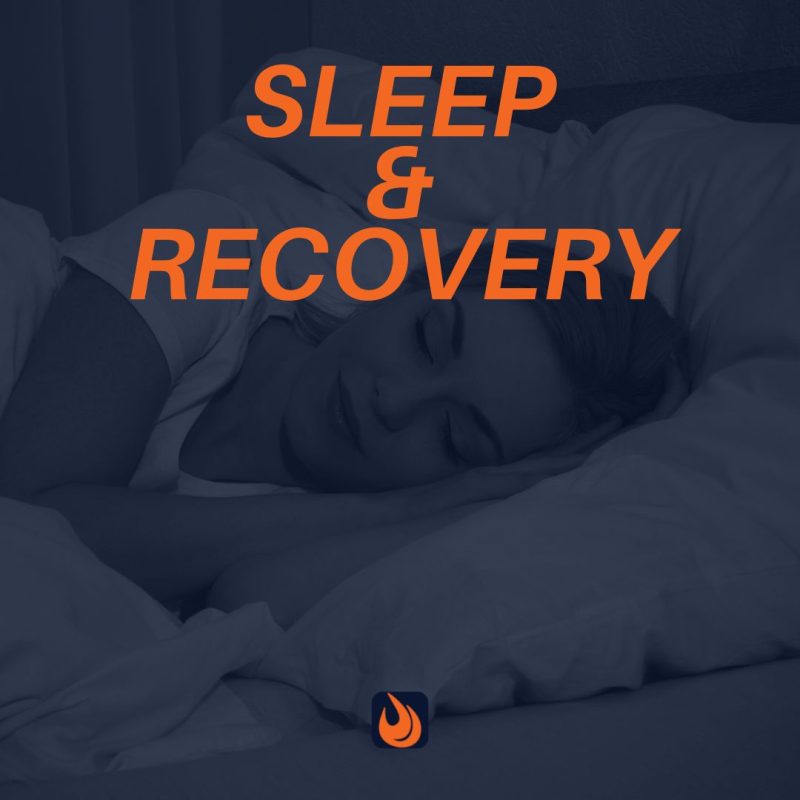
While in pursuit of body and health improvements, many people focus on things like workout routines and supplements, however, but may fail to consider arguably the most vital component of proper training—recovery. Physical training is only the stimulus to which the body adapts; sufficient rest is essential to allow time for the adaptations to take place. Personal trainers should recognize the important connection between sleep and recovery for their clients’ optimal goal attainment.
With adequate sleep, athletes run better, swim better, and lift more weight. Exercise may be one of the best ways to achieve healthy sleep. Research has found that people with minor sleep disturbances improved after four months of brisk walking 30 minutes, four times a week, and also, that sleep improved in a group of seniors who exercised regularly.
Why You Need Stable Sleep
Sleep, a state that occupies about one-third of our lives, is as basic a need as food, and vital to physical well-being. The main role of sleep is to restore the body’s energy supplies that have been depleted through the day’s activities. Factors that may influence human sleep patterns include physical size, muscle mass, brain size, and current level of physical fitness.12
Research indicates that people with a very high level of physical and intellectual activity need more sleep to fully recuperate. With that in mind, it is reasonable to think that the higher your activity level, the more sleep you need to restore your capacities. Physical labor seems to increase the need for sleep more than intellectual work, a combination of both leads to the greatest sleeping needs, probably due to the fatigue of several systems of the body simultaneously.
Much of what is known about sleep stems from the groundbreaking 1953 discovery of rapid eye movement (REM) sleep.10 This is an active period of sleep marked in humans by intense activity in the brain and rapid bursts of eye movements. At the same time, scientists discovered that REM sleep is when dreaming occurs.
Before the 1950s, most scientists thought of sleep as an unchanging, dormant period, and considered it of little interest to science. During this time little was known about sleep or about dreaming.
The earliest hints that sleep was a changing state came with studies showing that blood pressure, heart rate, and other body functions in humans rise and fall in a pattern during sleep. Because researchers had observed some eye movement during sleep, they recorded these movements by placing electrodes behind the eyes. They also recorded muscle activity and brain waves. They found regular periods of very rapid eye movement and rapidly changing brain waves that alternated with periods of deep, quiet, sleep marked by large, slow brain waves. Later, scientists found that the body is paralyzed during REM sleep.10
Lack of sleep has major implications for public health, safety, productivity, and well-being. Little is known of the function or the role sleep plays in health and disease. It has been estimated that more than 60 million Americans, or approximately one in three adults, experience inadequate sleep that can interfere with daily activities.3 Excess sleepiness has been associated with accidents at work or at home, and at least three percent of serious automobile accidents and fatalities are due to a fatigued driver.3 Sleep deprivation also affects us physically.
Insufficient rest greatly reduces your recovery capacity, and thus your capacity to do physical work. Athletes undergoing an intense training program should sleep at least 9-10 hours/night and adding a short nap right after training is optimal. Each year sleep disorders add $16 billion to national health-care costs (e.g. by contributing to high blood pressure and heart disease). This figure does not account for accidents and lost productivity at work.
The National Commission on Sleep Disorders estimates that sleep deprivation costs $150 billion a year in higher stress and reduced workplace productivity (US, 1999). Forty percent of truck accidents are attributable to fatigue and drowsiness, and there is an 800% increase in single-vehicle commercial truck accidents between midnight and 8 AM. Major industrial disasters such as Three Mile Island, Chernobyl, and the Exxon Valdez oil spill, have all been attributed to sleep deprivation.5
The Five Stages of Sleep
Sleep is divided into REM and non-REM types.8 Non-REM sleep consists of the lighter stages — stage 1 and stage 2 — and a deep form of sleep known as Delta (or slow-wave) sleep, which comprises stages 3 and 4. Most of the first third of the night, non-REM delta sleep predominates. After about an hour and a half in most normal people, the first REM period begins, and this alternates with non-REM sleep throughout the night. Most people have 4-5 REM periods in a given night.
It is not known whether REM or delta sleep is deeper, but it generally requires more stimulation to arouse the sleeper from delta sleep. As people sleep they go through five different stages. These stages are broken down separately because there are changes in your brain waves. About every 90-100 minutes people pass through all 5 stages.
In stage one of the sleep cycle brain waves are referred to as theta waves. They consist of a 4-7 cycle per second rhythm. (Non-REM Sleep) In stage 2 of sleep, the brain generates sleep spindles. Spindles are a 12-14 rhythm that lasts a half of a second. Sleep talking usually occurs during stages 1 and 2 of sleep. Sleep talking is mumbled and usually not understandable.
(Non-REM Sleep) Delta waves are produced by the brain in the third stage of sleep. These brain waves become slower when the sleep cycle begins. During this cycle your heart rate, blood pressure, and arousal decline. (Non-REM Sleep) Stage four is very similar to stage 3 because Delta waves continue in the brain.
During this stage of sleep, most dreams and nightmares occur. (Non-REM Sleep) In stage five your breathing becomes irregular and more rapid. Your heartbeat rises and your eyes dart around in a momentary burst of activity while your eyelids are closed. This is called REM sleep (REM Sleep).
Even though REM sleep is a much deeper sleep it is not shown to be any better than Non-REM sleep. The reason for this is our bodies need for both kinds of sleep in order to be fully rested. Without one the other would never be as effective.8
Factors Affecting Sleep
Medications – Insomnia is a side effect of many common medications, including over-the-counter preparations that contain caffeine. People who suspect their medications are causing them to lose sleep should check with their physician9.
Alcohol – Alcohol suppresses deep sleep, produces sleep fragmentation, and relaxes the upper airway muscles, which worsens snoring and the severity of obstructive sleep apnea. Apart from its negative impact on sleep, alcohol reduces your intellectual performance, and should be avoided at times of highly creative effort!
To a highly creative individual, alcohol poses a major health-vs-brain dilemma. Certainly, it should be avoided 3-5 hours before sleep and before intellectual work. If you drink yourself to sleep (e.g. after a stressful day), you should remember that alcohol is quickly metabolized, and will produce an acetaldehyde rebound effect that will greatly increase your chances of waking up during the night. This effect keeps alcohol-addicted people up at night, depriving them of REM sleep6.
Caffeine – Ninety percent of Americans use some form of caffeine to fight the feeling of drowsiness. Caffeine has a profound effect on the central nervous system by blocking adenosine receptors5, which holds drowsiness at bay. Besides coffee, caffeine is found in soda, chocolate, and tea. It is an addictive substance and acts, via similar channels, as amphetamines and cocaine. As an arousal drug, caffeine may cause insomnia. Caffeine will suppress REM sleep and this is why it should never be taken 6-7 hours before sleep (caffeine’s half-life is about 6 hours for normal metabolizers).
Caffeine tends to drive many people into a vicious circle. You drink it, you get a boost in adrenaline, you feel more energetic, you get a boost in dopamine, you feel better, you feel you can stay up late, you sleep less, and then you are more sleepy the next day. You will then need more caffeine, due to down-regulation, to get the same energetic feeling and you will continue to increase the dosage.
Can Sleep Increase Growth Hormone Release?
Researchers at the University of Chicago found that the quality of men’s sleep decreases with age along with the body’s production of growth hormone. A lack of quality sleep may contribute to love handles and double chins. The drop in growth hormone, in turn, is thought to lead to flab, although the researchers did not specifically measure the effect on body composition.
“We actually know that if we increase deep sleep, we can increase growth hormone,” said Eve Van Cauter, a professor of medicine who led the study, published in the Journal of the American Medical Association.13 The study was limited to healthy men, and it is unclear whether the findings apply to women. Dr. Van Cauter and her team looked at sleep studies conducted on 149 men from 1985 to 1999. They found that by the time men reach age 45, they have nearly lost the ability to fall into deep sleep, which is when men primarily produce growth hormone.
In studies of the elderly, growth hormone deficiency has been connected to obesity and the loss of muscle mass. The men involved in the sleep studies were of normal weight and ranged in age from 16 to 83. Researchers found that as the men moved into middle age, from 35 to 50, their total amount of sleep remained fairly constant.
The study also found that after age 50, men’s total amount of sleep declined by about 27 minutes a decade, with them waking more frequently throughout the night and staying awake for longer periods of time. REM sleep, associated with dreaming, also declined after age 50 to about 50% of a younger man’s level.
Sleep and Recovery: Time is Necessary after Exercise
How long does it take for the muscles to fully recover after an exhausting workout? Fatigued muscles do a poor job of protecting their associated connective tissues, increasing the risk of damage to bones, cartilage, tendons, and ligaments. Tired muscles provide inadequate support for tendons, ligaments, and bones, increasing the risk of strains, sprains, and stress fractures.
Recently, researchers at McMaster University in Hamilton, Ontario, and the Washington University School of Medicine in St. Louis conducted a study to determine how long muscle recovery takes. In their study, six healthy young men who regularly engaged in weight training carried out four sets each of biceps, concentration, and preacher curls (12 sets in all), with 3-4 minutes of rest between sets. Resistance was set at 80 percent of maximum and each set consisted of as many reps as a subject could handle.
Based on this study and a previous investigation, scientists determined that the rate of protein synthesis in muscles stressed by a hard workout increases by about 50 percent four hours after the rugged workout is over, while the rate of synthesis in muscles not being used during training remains unchanged. This is evidence that muscles are repairing damage accrued from the workout and perhaps building new structures to make themselves stronger and more fatigue-resistant in the future.
This repair process seems to peak about 24 hours post-workout, when muscle protein synthetic rate was up by a hefty 109% in the McMaster-Washington research.
However, the McMaster-Washington scientists found that about 36 hours after a rough workout, the building process is pretty much over, and the muscles are back to routine housekeeping. It’s important to point out that this study was carried out with experienced weight trainers; novice lifters might have required a longer recovery process.
Finally, there is undoubtedly variation between athletes. For example, although the average recovery time was 36 hours in the McMaster study, some individuals might be finished recovering just 30 hours after a similar workout, while others could take 40-48 hours.
As you can see, lots of factors can interact to determine recovery time. Recovery time reduces injury rates by providing muscles and connective tissues the necessary amount of time to rebuild and repair themselves between workouts. You should also remember that increases in training demand increase in resting too.
Anytime your training volume increases by more than 2-3 percent, you need to make sure that you’re getting more sleep and taking more time to rest during the day. Without this rest your workouts will suffer and your body will never truly recover7. It cannot be stressed enough, especially to the natural athlete — when you feel mentally or physically tired, take the day off.
Keys to Recovery
The following tips may help promote recovery following your workout:6
1. If you feel tired or sluggish on a particular day, don’t train, or train at a minimal level of effort. Your body is telling you that it is still in the recovery process and an intense workout at this particular time will be counterproductive. If you have planned a workout, postpone it and carry it out the following day (as long as you feel fully recovered). To get the most out of your workout, two intense workouts back to back are usually as much as you should do without crossing over into the over-trained state. Look into heart rate variability training where app tracking can offer information about your physiological state and whether your body is in prime condition for intense exercise or perhaps a rest day.
2. To increase the number of quality workouts you carry out (i.e., to avoid spending too much time recovering), try to use the 36-hour principle. For example, you could perform an intense workout Tuesday morning, another Wednesday evening, and a third intense session Friday morning, thus fitting three tough sessions into a time frame that usually accommodates just two. You could then take Saturday off and complete a long workout on Sunday.
3. To jump-start recovery, make sure you replenish yourself with ample amounts of carbohydrates shortly after your training sessions.
4. Ultimately, you are the best judge of how well you are recovering between workouts. If you look forward to each week of training and approach your quality workouts with high energy and determination, you are recovering well, perhaps too well, but it is better to recover too well than to recover poorly (recovering too well means you could probably carry out your difficult workouts sooner than you usually do). If you are feeling tired during many of your weekly workouts and your performance times are a bit off, it’s quite likely that you can improve your performance not by working harder but by increasing the quality and quantity of your recovery.
Exercise and Its Impact on Sleep
Feeling Tired
If you work your body hard enough, it will get tired. You have put in the effort and your muscles feel it. Feeling tired may be the ticket to a restful night’s sleep. Some experts have found that a good cardio workout can enhance sleep without medication. Exercising outdoors might be even more beneficial. Exercising to sleep effectively requires just a little attention and experimentation.
Handling Stress
Worrisome thoughts can make sleep difficult. Many people find regular exercise helps with handling stress. If you feel less stressed, your mind is less likely to wander at night. Exercise endorphins lift our spirits, which might contribute to a reduction in stress or how it is handled. While many studies are inconclusive, the results tend to point to exercise benefiting sleep. Much like a runner’s high, exercise releases endorphins… that’s a really good feeling. Once that levels off, there is a strong probability of relaxation.
Body Heating and Cooling
Another reason exercise helps with sleep is how our bodies heat up with exercise, and then cool down afterward. The heating and cooling can have another relaxation effect. Mimic that with a warm bath before bed and see if the results find deeper sleep patterns.
Greg Hayes is an avid swimmer. He swims almost every day, mostly in the ocean. In the winter, this can be quite cold, but he seems to have conditioned his body to heat up in the cold water and air.
“Exercise directly correlates to a restful body,” Hayes said. “Swimming is one of my favorite exercises from the standpoint that it is a total body workout that is free of the impact stress that running, cardio machines, walking, or even biking put upon the hips, knees, ankles, and feet. It provides both cardio and resistance exercise for the body. Both aerobic and anaerobic swimming work the body with and without oxygen which I believe provides for a complete workout that delivers gratification to the muscles, lungs, and body tissue without the stress of gravity.” Ultimately, it leads to restful sleep.
How’s Your Bedfellow?
A great number of adults are likely to be sharing their sleep space with a partner. This fact of life can also be the greatest disruption to restful sleep.
Circadian Rhythm misalignment
Each individual is born with a specific chronotype (early bird/night owl), which includes an ideal timing for sleep and ideal volume. Sleep/wake preferences are pre-programmed to an extent and when respected can provide for optimal daytime function. This issue can be solved by keeping the sleeping space dark and quiet from the time the early bird goes to bed until when the night owl wakes up and agreeing to allow each person to sleep and wake as they choose.
Consider these five physiological sleep factors when making a sleep space accommodating.
Being woken up at night
Even with a well-crafted sleeping space, one person in the room might have a sleep disorder like restless leg syndrome or sleep apnea that causes excessive movement or noise at night. Or, one person might have nighttime allergies or illness. The brain runs various programs at night that helps the body restore itself and when they get interrupted, it has effects on daytime functioning. Especially when it compounds across several nights, weeks, or months.
In this case, working with a medical provider to treat nighttime illnesses or other underlying health conditions is recommended. Otherwise, separate sleeping quarters might be the only choice. It then becomes important to make connection and intimacy a priority outside of sleep times to maintain relationships.
Sleep Tips
“Sleep is incredibly important in the training process with its contribution to recovery,” said Ian King, one of the top strength coaches in the world. King, who has coached professional and Olympic athletes since 1984, believes that sleep is an area still largely ignored. “In reality, it’s a full-fledged member of what I call the training triangle — eating, training, and sleeping!,” King said. The following are tips from “the King” to help get a good night’s sleep.14
- Get as many hours before midnight as you can (there’s empirical support that an hour before midnight is worth two hours of after-midnight sleep).
- Get in a regular pattern of sleep — when you go to bed and when you get up. When you change this pattern, irrespective of whether you actually get more sleep, it can negatively affect the impact on recovery.
- Make your room dark and noise-free. That means using dark curtains and closing windows and doors. Melatonin is released in the absence of light, including blue light. Cortisol drops at night and starts rising a few hours before it’s time to wake up, also setting its routine based upon light and darkness. In the absence of a predictable rhythm, these two get confused, not sure what the schedule is resulting in poor sleep patterns.
- Adjust the temperature. Ideal sleep temp is around 67-68 degrees!
- Engage in a relaxing activity before turning the lights out — there’s nothing worse than going to bed fired up or overly excited. Some find a warm bath effective; I find reading a book for 10-20 minutes helps me feel drowsy.
- Consider the impact of your sleep partner and adjust accordingly. Consider sleeping in a different room for a few nights to see how it impacts your sleep if your partner is somehow disrupting your pattern.
- Once the lights are out, stay on your back until you find you are about to go to sleep and then roll to one side. o I do support the use of sleep inducers when you’re struggling to go to sleep. I have found the following effective: melatonin, ZMA, and Usana Essentials pack. I use these if I work late and have only limited hours of sleep, or if I am in a new time zone and struggling to get back to sleep. If struggling to get to sleep, I recommend melatonin or prescription sleep inducers for no more than 3 nights in a row.
- Finally, if you use an alarm clock to wake up, your first few hours of the day aren’t as “good” as they would be if you were in a pattern where the body woke up naturally. A 1995 survey conducted by Bruskin/Goldring Research for the Better Sleep Council (BSC), surveyed 1,000 adults and found that few understand the important role sleep plays in normal, daily brain functions, and many actually short-circuit their brain power by getting too little sleep
Neurological and sleep experts concur that sleep is essential for the brain to function optimally. However, BSC’s survey reveals a disturbing finding: Although the majority of those polled report that their typical weekday requires mental alertness, one in three say they don’t get enough sleep. What’s more, 53 percent of respondents admit their mental capabilities suffer when they lose sleep.1

Conclusion
“People don’t respect sleep enough,” says Daniel O’Hearn, a sleep disorders specialist at Johns Hopkins University. “They feel they can do more — have more time for work and family — by allowing themselves less time for sleep. But they do sleep; they sleep at work, or driving to work.”
The National Highway Traffic Safety Administration estimates that more than 200,000 crashes each year involve drivers falling asleep at the wheel and that thousands of Americans die in such accidents each year4.
Getting the proper amount of sleep is essential, especially if you are physically active. Along with a balanced diet and an intense exercise program, getting the right amount of sleep may be the last ingredient to help you decrease body fat or increase muscle mass and strength. Strive for seven to eight hours of sleep a night. Finally, without the proper amount of recovery and sleep, a training program designed by Joe Weider himself will yield little or no results.
References
https://www.hopkinsmedicine.org/health/wellness-and-prevention/exercising-for-better-sleep www.supermemo.com/articles/sleep.htm
https://academic.pg.cc.md.us/~mhspear/sleep/stages/nrsleep.html 9. Insomnia:The Facts You Need To Know, https://my.webmd.com/content/article/3462.138
The Time Course for Elevated Muscle Protein Synthesis Following Heavy Resistance Exercise, Canadian Journal of Applied Physiology, vol. 20(4), pp. 480-486, 1995. Associated Press, 8/16/2000






